#little murder machine i love artificer being the embodiment of rage
Text
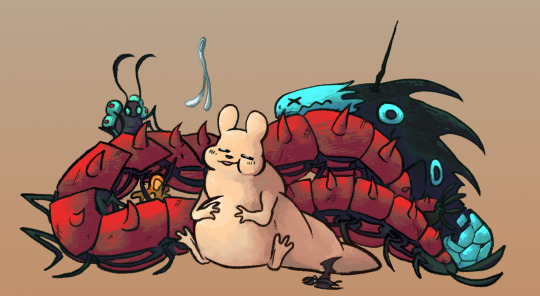
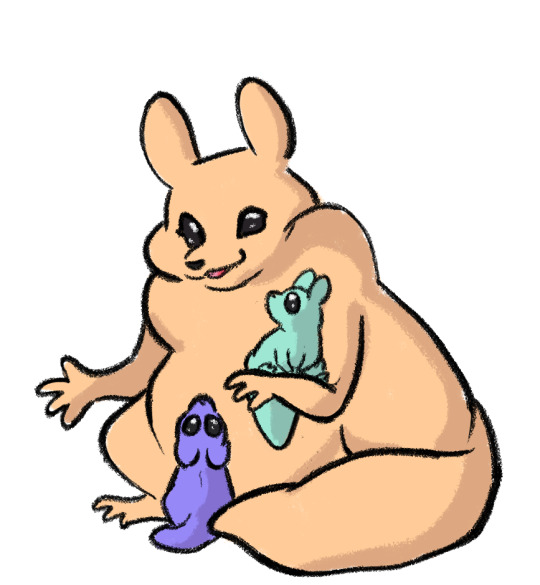
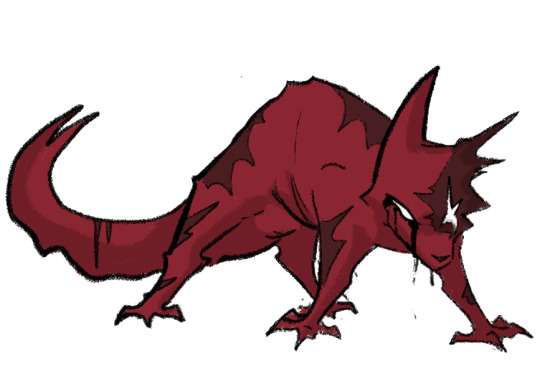
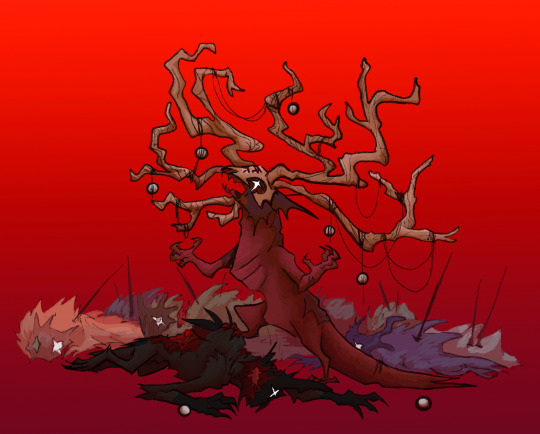
These two slug cats have a lot of parallels to me so I really enjoy them. I love how they are the two starting downpour slug cats yet they are complete opposites.
You have Gourmand enjoying life, crafting and making use of the wonderful little things in life. Going back home and sharing those wonders with others. And (in my headcanons at least) Gourmand starts a family even. (The two little slug pups at the end of the campaign).
Artificer's campaign starts with losing family and subsequently losing yourself. Dedicating yourself to spreading the hurt and pain that was dealt to you. Finding your way into the deepest of parts of where the enemy resides until it's not even about the pups anymore.
#rainworld#rain world#my art#the gourmand#the artificer#rw gourmand#rw artificer#this is also why i thought a starved looking artificer sounds fun#she does no self care and uses all its energy to kill maul bite bite#little murder machine i love artificer being the embodiment of rage#while gourmand is about smarts and family mwuah mwuah#love them#also had fun having some variety with some slug cats!#tw injury#tw mild gore
677 notes
·
View notes
Note
So you've talked a lot about Darkseid, but what about the other New Gods?
SO THIS HAS BEEN IN MY INBOX FOR ALMOST AS LONG AS THIS BLOG’S BEEN AROUND AND I JUST FINALLY FINISHED FOURTH WORLD
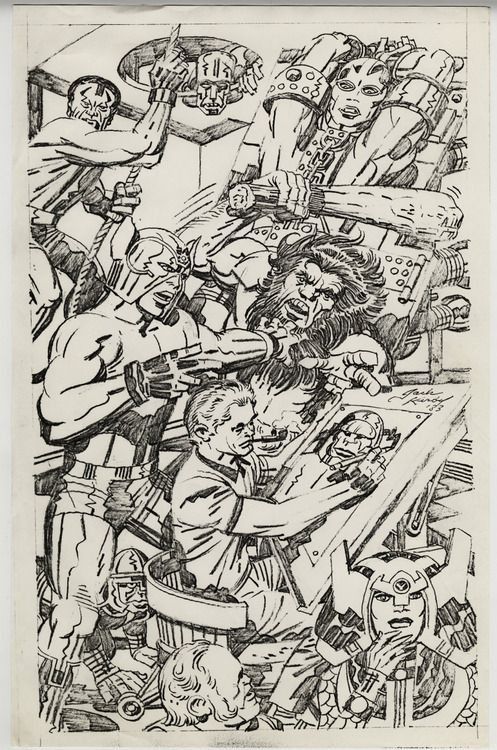
Well that sure was something. My musings on some major players that I either have substantial thoughts on, or where I especially think the majority consensus/interpretation has subsequently gotten them wrong (a state Kirby is well aware of, because a HUGE part of “Even Gods Can Die!” is him being frustrated at subsequent handlings of the characters even by 1984 mucking things up):
Orion: Perhaps the most hard-done by as a result of Kirby never being able to fully finish Fourth World as he had imagined it, as his character arc ends on a cliffhanger for a decade and is forced into a rapid completion later. When he emerges, while a warrior born he’s also every bit the classical, magnificent hero you expect to see in a superhero comic to try and overshadow his inner demons, while by the end of New Gods he’s embraced not only his true face (the OTHER face, as his father would put it) in the fight against Apokolips but the murderous, sadistic rage that is his birthright, reveling in inflicting agony and very much the berserker others have since portrayed him as. Surely as much a product of his trauma from a childhood on Apokolips (a detail frequently glossed over) and a sense of being unwanted as anything genetic, it’s ultimately unconditional love for him as he truly is in Hunger Dogs that lets him overcome his fear that he can’t be anything but a monstrous tool in service of better people than himself, and embrace ‘the tomorrow overture’. Even his anger has its righteous if tragic place as a primal force of upheaval: “It defies time! It stands firm against the hammers of change! It mocks life and defies death!” I won’t get to it for awhile yet, but very curious what Simonson does with him.
Lightray: Rules! He’s the closest the New Gods have to a traditional superhero, and it’s in that capacity that while a lousy warrior next to Orion (Kalibak thinks little of his attempt at fighting him, mockingly deeming him a “callow little killer”), his strength is in transformation: he makes himself light, he turns a tormented weapon into the glory boat, a machine armed against the New Gods into a weapon against Darkseid, Orion from a man alone into a friend. He’s not a warrior, but he’s the one who makes a better world worth waging war for and who might one day make such war unnecessary. Also he and Orion have definitely fucked.
Mister Miracle: Not WILDLY off the mark since, but it’s interesting that as I expect a result of JLI he’s been written so often since as an everymanish, relatable, bordering-on-comedic figure, when under Kirby he was very much the archetypal good guy. One often committed to freeing others as he had been freed himself, in the likes of Ted Brown and Shilo Norman, an avenue I’m surprised hasn’t been explored more often from what I’ve seen. Also worth noting: Darkseid declared the moment he got his hands on the kid that Granny would be twice as hard on him as others, and that it would eventually drive the boy away and let the war resume. Which not only indicates Darkseid’s understanding of the subtlety needed in control, but would seem to take Scott’s rebellion out of his own hands…except that at the moment of his escape Darkseid still offered him a choice, implored the boy to allow him to “complete the destruction of Scott Free – so you may live with the majesty that is the power of DARKSEID!” And instead he turned his back on his god and chose to be what he is.
Barda: Shockingly, great as she’s been since, her background is often severely mischaracterized. The shorthand is “love saved her and turned her from a servant of evil to a champion of good!”, but that’s…while not entirely wrong, a bad way of presenting it. When she leaves Apokolips initially, even after she starts hanging out with Scott Free and Oberson after having helped the former escape years earlier, she still believes in Darkseid. She fights and hates her former allies not because she’s turned against his vision of the universe (this is in fact a major aspect often overlooked - under Kirby Darkseid’s agents don’t simply fear him, they sincerely believe in him and his vision of how the universe works) but because she sees them as loathsome, brutish executors of his grand design. In short, she doesn’t think it’s the system that’s the problem, but a bunch of bad apples. It’s her experience with freedom and simple pleasures and life on Earth, her lingering guilt over the death of her friend Auralie as eventually manifested in her protection and training of Shiloh Norman, and yes, her eventual realized love for Scott, that brings her around to realizing she truly desires a life beyond what Darkseid can offer.
Forever People: Okay I actually don’t have a ton to say about the Forever People, though I do think they’re underrated and underutilized. Naive and in over their heads as the frequently are they’re also the best of their peers, believing in freedom and transformation and the potential of those around them to become better - their defining moment for me is when they reassure Sonny Sumo that having the power of the Anti-Life Equation doesn’t make him a monster. “Where we come from the Anti-Life Equation is one of many others–almost as awesome!! But they merely exist!! It’s we who live!!”
Metron: The big figure I haven’t really been able to crack. Machinery as not necessarily cold mechanization but extensions of ourselves and our souls, and able to nourish them in turn, is a big aspect of Fourth World, but Metron as the embodiment of mechanization and knowledge feels like not just an outsider as he’s framed but one who never quite became whatever Kirby had in mind for him, making his crucial role at the end of Hunger Dogs a bit of a non-sequitur for me. I’d be curious to hear what other people think.
Desaad: God Desaad’s been made boring. Not that he isn’t fairly one-dimensional under Kirby too, but his craft and awful glee as the god of torture isn’t just in strapping people to tables and poking them with unpleasant tools, it’s in manipulating their emotions and agonies to a fever pitch - he should be such an unsettling figure, and instead he’s a simpering helpless toady.
Highfather: Not a perfect figure, given how he’s framed with the likes of Fastbak, and the Forever People, and the Pact, willing to deploy fear as a weapon in the name of peace as Darkseid will use chaos in the name of a larger order, but always trying - as with Darkseid, an imperfect vessel of what he represents, but capable of growth and realization as a leader.
Steppenwolf/Heggra: Essential to understanding The Pact, they’re the old ways of the world and war, petty despots and warrior-kings, supplanted by fascism in Darkseid.
Darkseid: So I’ve discussed Darkseid before in terms of his broad use and ideas, but the very specific ways Kirby presented him have their own dimensions. In the world of superheroes he’s larger-than-life and often such in here too, but in rare moments, and by the end entirely as all artifice is stripped away? Kirby’s Darkseid is a profoundly human figure. He recognizes the irony that the Forever People believe in letting all be who they are, for that very need to fulfill himself is why he must pursue conquest (“And of course - that’s the pity of it!”). While he thinks to himself “Oh, how heroes LOVE to flaunt their nobility in the face of death! Yet THEY know better than most that war is but the COLD game of the BUTCHER!” he too believes in “Boldness! Risk! The raw meat of existence!” even as he consigns himself to the role of puppetmaster rather than warrior. He does or so he tells himself “no more than what HAS to be done!!” rather than indulging in cruelty for its own sake. He dresses up in ridiculous costumes for his schemes, he gets sarcastic, he recognizes honor and respects worthy foes, he feels love, he craves the laughter of a friend, he fears the obsolesce of his preferred way of doing things, he tells himself that should he achieve omnipotence others will find “eternal shelter”. He’s a person, one capable of a range of emotions, but he is the TIGER FORCE AT THE CORE OF ALL THINGS regardless…not because he is a mythic unstoppable force, but because every day he rises and believes in himself over all others, because there is a black hole within him that he can only hope dominance might fill regardless of what pain he finds in the process. But as Mister Miracle’s battle with the Lump foretold, when left truly alone over a world that is himself he will be only within “a self-made prison”, reflections of his own fear and agony.
#New Gods#Fourth World#Kirby#Orion#Lightray#Mister Miracle#Barda#Forever People#Metron#Desaad#Highfather#Darkseid#Opinion
81 notes
·
View notes